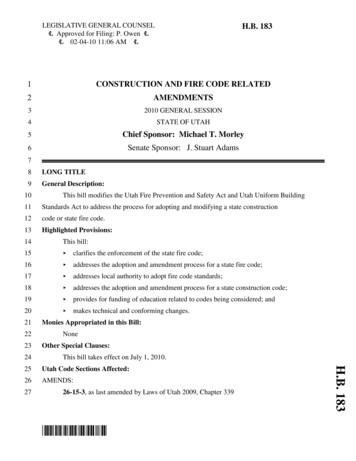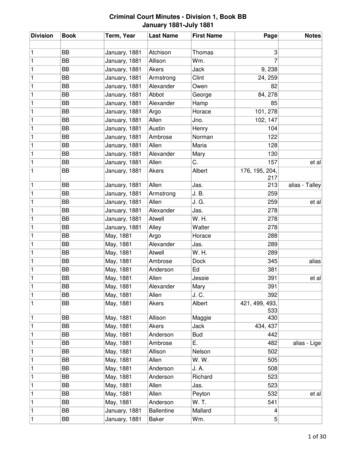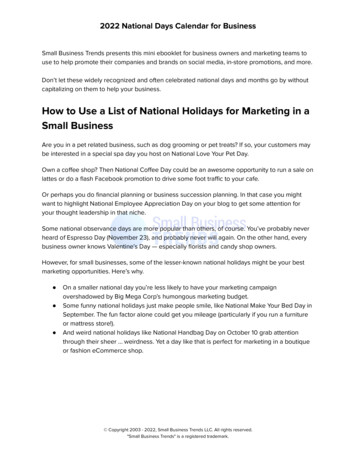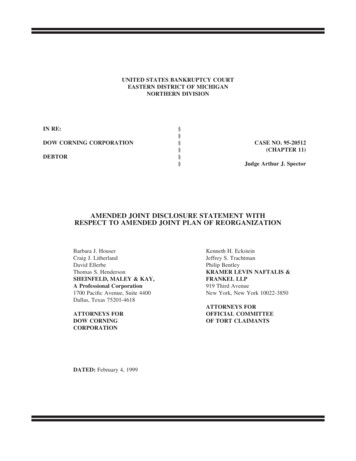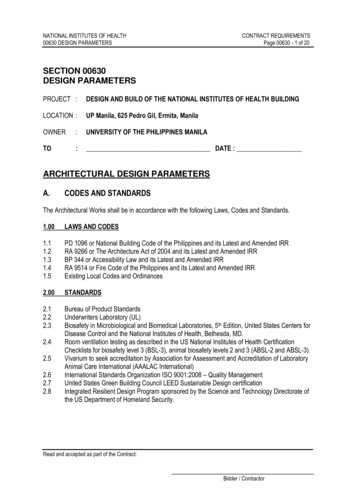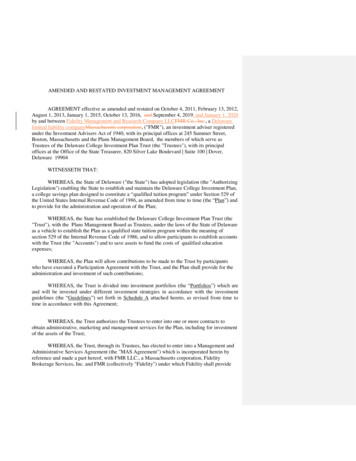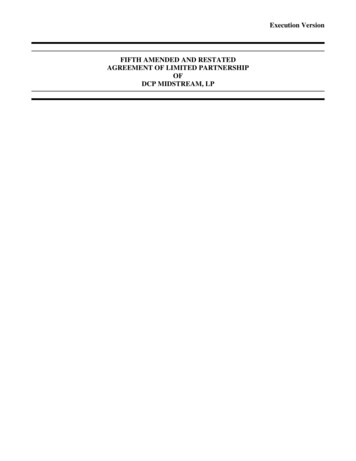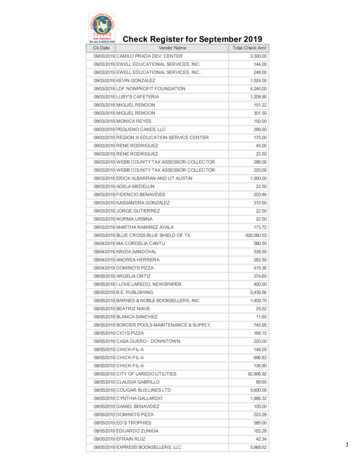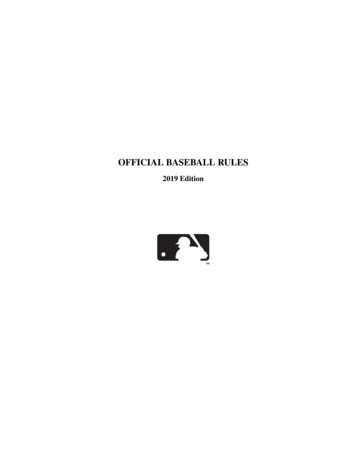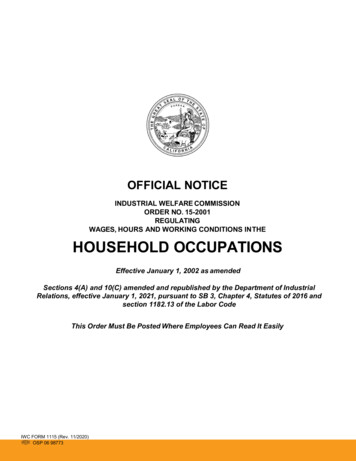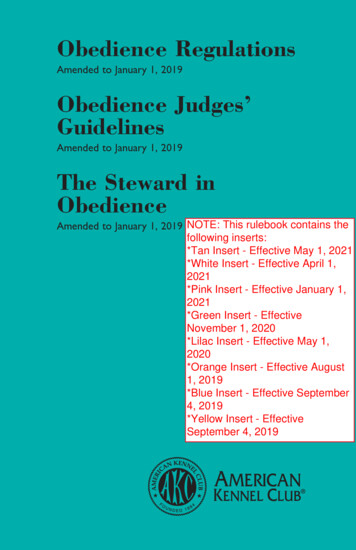
Transcription
Obedience RegulationsAmended to January 1, 2019Obedience Judges’GuidelinesAmended to January 1, 2019The Steward inObedienceAmended to January 1, 2019 NOTE: This rulebook contains thefollowing inserts:*Tan Insert - Effective May 1, 2021*White Insert - Effective April 1,2021*Pink Insert - Effective January 1,2021*Green Insert - EffectiveNovember 1, 2020*Lilac Insert - Effective May 1,2020*Orange Insert - Effective August1, 2019*Blue Insert - Effective September4, 2019*Yellow Insert - EffectiveSeptember 4, 2019
AMERICAN KENNEL CLUB’SMISSION STATEMENTThe American Kennel Club is dedicated to upholding the integrity ofits Registry, promoting the sport of purebred dogs and breeding for typeand function. Founded in 1884, the AKC and its affiliated organizationsadvocate for the purebred dog as a family companion, advance caninehealth and well-being, work to protect the rights of all dog owners andpromote responsible dog ownership.
Revisions to theObedience RegulationsEffective May 1, 2021This insert is issued as a supplement to theObedience Regulations amended toJanuary 1, 2019 and approved by theAKC Board of DirectorsFebruary 9, 2021CHAPTER 1 – OBEDIENCE REGULATIONSGENERAL REGULATIONSSection 3. Premium Lists, Entries, Closing of Entries.(paragraph 5) The premium list shall specify the name and addressof the Superintendent or Trial Secretary who is to receive the entries.Only one mailing address may be used for receipt of paper of entries.Paper entries delivered to any other address are invalid and must bereturned to the sender.Section 27. Limitation of Entries and Methods of Entry. If aclub anticipates an entry to exceed the capacity of its facilities for alicensed or member trial, it may limit entries, not to exceed up toeight hours of judging time per day, per judge.Prominent announcement of such limits will appear on the title orcover page of the premium list for an obedience trial or immediatelyunder the obedience heading in the premium list for a dog show. Thisannouncement must state that entries in one or more specified classeswill automatically close when certain limits have been reached, evenif this occurs before the official closing date. Non-regular classes,however, may be included, if so desired.However, a club, at its discretion, may choose to establish a waitlist in order to fill openings created by entries that are withdrawnprior to the event closing day. If a club is maintaining a wait list, thisshall be stated in the premium. The full entry fee shall be refunded toan entrant whose entry is replaced by a wait-listed entry.At obedience trials that have their own standalone event number, aclub may use either the First Received or Random Draw method ofacceptance of entries to a limited entry trial. The premium list muststate an opening date/time for when entries will be accepted. Thesetrials may be held in conjunction with rally or agility trials.When entries are limited in the regular Open B and/or Utility Bclasses, a club must designate a regular UDX class in the premiumlist. Dogs entered in this UDX class would be entered in both Open Band Utility B, and the combined entry fee for these two classes must
be paid. Once the limit has been reached in either the regular Open Bor the Utility B class, the regular UDX class will be consideredclosed and any subsequent entries for this class will be unacceptablein their entirety.If Preferred Open and Preferred Utility are offered and entries arelimited in these classes, a club must designate a Preferred UDX classin the premium list. Dogs entered in this Preferred UDX class wouldbe entered in both Preferred Open and Preferred Utility and thecombined entry fee for these two classes must be paid. Once the limithas been reached in either Preferred Open or the Preferred Utilityclass, the Preferred UDX class will be considered closed and anysubsequent entries for this class will be unacceptable in their entirety.First Received. Entries are accepted in the order of receipt. Ifstated in the premium list, a club may further restrict the deliveryoptions (i.e. No FedEx, No hand-deliveries at any time.) However,USPS delivery must be allowed.Random Draw. When using the Random Draw method, entriesare treated equally without regard to date/time received or any othercriteria during the Draw Period. The AKC strongly recommendsusing the Random Draw method for trials which are likely to exceedthe “total entry limit” within the first 24 hours after the opening dateand time.An envelope containing entries for more than ten (10) dogsmaximum will be considered invalid and must be returned to thesender.Random Draw Time Period. Clubs determine a “Draw Period”during which time entries are accepted for the Random Draw.Acceptance of entries begins on the opening date/time established forthe trial as stated in the premium list. This time period must be at leastseven (7) days in length (14 days is recommended). The RandomDraw Time Period closing date and time must be stated in thepremium list.Reserved Spots for Trial Workers. When using the RandomDraw method, the club may reserve a specific number of spots forexhibitors who have been selected to work at the trial. A spot isdefined as a person who has entered the trial and has been selected towork. The number of reserved spots allowed is based on the numberof rings used. A club may reserve up to three (3) spots for each ringthat is used (i.e. one ring equals three reserved spots, two rings equalssix spots, and so on). Once the spots reserved for workers are filled,the remaining entries then become part of the Random Draw.Conducting the Random Draw. If the entry limit for the trial isexceeded during the Random Draw Time Period, the club mustconduct a Random Draw of all entries received, otherwise theRandom Draw is not necessary. One draw may be conducted for alltrials (concurrent or consecutive) held at the same site. One secretary
or a group of cooperating secretaries are responsible for conductingthe draw.The Random Draw must be held within 48 hours of the “DrawPeriod” closing date and time and held in a place accessible to thepublic. The location, date and time of the draw must be stated in thepremium list.In conducting the draw, the Trial Secretary must avoid any methodthat raises any questions as to its randomness and impartiality.The drawing may be conducted by manually selecting entryenvelopes or by using a computerized random drawing program. Ineither case, all entries submitted in one envelope must be includedand counted. If the last envelope selected in the Random Drawcontains entries that would exceed the stated total entry limit, amanual or computerized random draw of those individual entriesmust be conducted.After the advertised limit of entries has been randomly drawn,clubs maintaining a wait list will randomly draw all remaining entriesfor a position on the wait list.Accepting Entries After the Random Draw Time Period. If thetrial did not exceed the limit during the Random Draw Time Period,all the entries received during this time period will be accepted intothe trial. Clubs may continue to accept entries after the Random DrawTime Period according to the procedures for the First Receivedmethod of entry, though all entries must be received prior to theclosing date and time for the trial.Tan InsertIssued: February 26, 2021RO2999 (05/19)
NOTICE OF ONE-YEAR PILOT PROGRAMObedience RegulationsEffective April 1, 2021One-year Fix ‘n Go Pilot ProgramApproved by the AKC Board of DirectorsFebruary 9, 2021CHAPTER 2 – OBEDIENCE REGULATIONSREGULATIONS FOR PERFORMANCE AND JUDGING /JUDGING STANDARDS AND PROCEDURESSection 27. Training and Handling in the Ring. When a handler isusing excessive verbal commands, this could indicate the dog is notunder control and is not working with the handler willingly. The judgemust determine if this dog should be released for a lack of control.The handler is not allowed to correct or discipline a dog and will bereleased from the ring.When the dog’s performance does not meet the handler’sexpectation, the handler may choose to use a “Fix n’ Go” option once,which allows the exhibitor to immediately reattempt a singleindividual exercise. This allows the team to reattempt that oneexercise, and then leave the ring. In a two-part exercise, the handlermay choose only one part to reattempt. It is the handler’sresponsibility to tell the judge they are choosing to “Fix n’ Go.” Usingthe Fix n’ Go option will result in a non-qualifying score (NQ). Thehandler may begin the reattempt from the start or at any point duringthe exercise. The judge will call the orders for the reattemptedexercise as normal. If a jump needs to be reset, it will be set to theoriginal height.The handler may choose to help the dog through the Fix n’ Goexercise. Helping the dog may be accomplished using verbalencouragement, including additional commands and praise, and/orapproaching the dog in a friendly/positive manner without touchingthe dog.Harsh verbal and /or physical corrections will not be tolerated. Ifthere is any determination of harshness by the judge, the handler willbe immediately released from the ring.Spectators form their opinion of the sport through seeing the actionof the handler and the dog. Care must be taken to avoid any action thatmight reflect poorly on the sport.For information please go Notice Date: February 26, 2021RO2999 (05/19)
Revisions to theObedience RegulationsEffective January 1, 2021 andThis insert is issued as a supplement to theObedience Regulations amended toJanuary 1, 2019 and approved by theAKC Board of DirectorsNovember 10, 2020CHAPTER 1 – GENERAL REGULATIONSSection 3. Premium Lists, Entries, Closing of Entries andCatalog Order. A premium list must be provided for sanctioned“A,” licensed or member trials. The premium shall be published andshall measure not less than 5½ x 8½ inches or more than 8½ x 11inches.To be acceptable, an entry must: Be submitted with the required entry fee Be on an official AKC entry form Be signed by the owner or their duly authorized agentInclude all of the following information: Name of show/trial-giving club Date of show/trial Breed Variety, if any Sex Name of class(es) entered Full AKC name of dog Name of owner(s)/co-owner(s) Address of ownerInclude one of the following: AKC number PAL number AKC Canine Partners listing number Foreign registration number and country of registration for anunregistered imported dog Identification number issued by AKCInclude the following, if known: Date of birth Place of birth Name of breeder(s) Name of sire Name of dam Jump height
A club will arrange entries according to jump height order in allclasses in which jumps are used. It will be stated in the premium listwhat jump height will begin the class and if the order will beascending or descending. Handlers with multiple entries in the sameclass and with the same jump height should be accommodated. Thecatalog must be prepared in the following class order, regardless ofthe order in which the classes are listed in the judging program. Regular classes Preferred classes Optional classes Non-Regular classesFor all other catalog requirements, refer to the Rules Applying toDog Shows.Note: A dog listed with AKC Canine Partners should mark theirbreed as an “All American Dog.”The premium list shall specify the name and address of theSuperintendent or Trial Secretary who is to receive the entries.Opening & Closing Dates. In order to provide fair opportunity forall exhibitors to enter upcoming events, premium lists are required tobe published at least 72-hours prior to the acceptance of entries.Events whose entries are limited must have a defined date and timefor the opening of entries which is to be prominently displayed on thecover page of the premium list. In addition, every premium list shallspecify the date and time at which entries for a trial shall close. Forall trials the specified closing date and time must be no later than11:59PM seven (7) days prior to the trial.Whenever the closing day falls on a postal holiday, entries receivedin any form up to 24 hours from the published closing date and timemay be accepted.Section 14. Dogs That May Not Compete. (Paragraphs 8 & 9)No exhibitor may show a dog under a judge at an obedience trial ifthe exhibitor has participated in a training session taught by thatjudge within ten (10) days prior to the date of the event.No dog may be entered or shown under a judge at an obediencetrial if the dog is owned or handled by any person who has regularlyserved as a trainer or instructor of that judge, either individually orthrough classes, or if the dog has been regularly trained or instructedby the judge within ten (10) days prior to the date of the obediencetrial. “Trained or instructed” applies equally to judges who trainprofessionally or as amateurs and to judges who train individual dogsor train or instruct dogs in classes with or through their handlers (see“Glossary of Terms”).
In either case above, the ten (10) day period is not in effect when ajudge has been assigned on an emergency basis within 72-hours of anevent.CHAPTER 2 – REGULATIONS FOR PERFORMANCE ANDJUDGING / JUDGING STANDARDS AND PROCEDURESSection 1. Standardized Judging. (Section on Heeling Pattern)Heeling Pattern. The same pattern should be maintained as far aspracticable for each competing dog. This is a foundation exercise, andit determines the standards for all exercises in which the dog isheeling. The minimum heeling requirements for any class are normalheeling, a fast, a slow, a left turn, a right turn, an about-turn, a halt,and a sit.The heeling patterns should not be in the area of the table and/orgate and should have only one element of an exercise on a leg. (Forexample, there shall not be a halt and a slow on the same leg of anexercise.) A fast must always be on a long dimension of the ring; slowmay be either on the short or long dimension of the ring. The fast andslow should be of significant length, not just several steps. No patternwill have more than one fast and one slow. If possible, have one leg ofthe heeling pattern with no element on it. The “L” pattern is aminimal pattern. Other patterns are acceptable, but excessivecomplexity should be avoided.The judge may leave the Figure Eight cones in position in the ring,provided this equipment will not interfere with the performance of theother exercises.CHAPTER 3 – NOVICESection 5. Heel on Leash and Figure Eight. (Paragraph 6)For the Figure Eight, the handler will stand and the dog will sit inheel position facing the judge, midway between two cones that are 17to 37 inches high and no more than 15 inches wide at the base, thatwill be placed 8 feet apart. The Figure Eight in the Novice classeswill be done on leash; the handler may go around either cone first.The judge will ask “Are you ready?” before giving the first order.The handler and dog will walk briskly around and between the twocones twice. There will be no about turn, fast or slow, but the judgemust order at least one halt during this exercise and another halt atthe end.Pink InsertIssued: November 16, 2020RO2999 (05/19)
Revisions to theObedience RegulationsEffective November 1, 2020 andThis insert is issued as a supplement to theObedience Regulations amended toJanuary 1, 2019 and approved by theAKC Board of DirectorsMay 12, 2020CHAPTER 1 – GENERAL REGULATIONSSection 1. Application to Hold an Obedience Trial. Anobedience club that meets all the requirements of the AmericanKennel Club and wishes to hold an obedience trial must apply on theform the AKC provides for permission to hold such a trial.In addition to obedience clubs, any AKC club may be grantedpermission to hold an obedience trial if, in the opinion of the AKCBoard of Directors, it is qualified to do so, provided the club holds theevent(s) for which it was originally formed at least once every twoyears.The trial may be held either in conjunction with a dog show, rallytrial, agility trial or as a separate event. A club that is not a member ofthe AKC must pay a license fee in order to hold a trial. The AKCBoard of Directors determines this fee.A club may hold two all-breed obedience trials concurrently orconsecutively at the same site on the same day, or two all-breedobedience clubs may hold their obedience trials one following anotherif the events are held on the same site on the same day. The combinedscheduled judging program for both events should not exceed eighthours of judging time. This information must be clearly stated in thepremium list(s).No judge will be assigned to judge for more than eight hours inone day. This limit includes rally and/or any breed judgingassignments.Specialty and group clubs have three options to hold anobedience trial.(1) These clubs may hold a trial exclusively for their own breed(s).(2) If entries are limited, these clubs may accept entries of dogs oftheir own breed(s) first then accept entries from group breeds or allbreeds until the entry limit specified in the premium list is reached.(3) These clubs may hold their specialty or group obedience trialfollowed by an all-breed or group obedience trial, so long as thescheduled judging program for both events does not exceed eighthours of judging time.
If option (2) is selected, awards as described in these regulations,Chapter 1, Sections 19-22, will be offered for the specialty breed(s).In addition, awards as described in these regulations, Chapter 1,Sections 19-22, will be offered for the all-breed event.If option (3) is selected, the specialty obedience and all-breed orgroup obedience trials will be approved and held as two separateevents.Any club eligible to hold all-breed obedience trials may open theirtrial to dogs listed with AKC Canine Partners at their option. Thismust be clearly stated in the premium list if excluded.Section 2. Special Event Trials. The AKC allows clubs to offertwo types of Special Event Trials, 1) Junior Showcase Events limitedto Juniors only; and 2) Special Event Obedience Trials where a clubproposes a unique mix of obedience classes or a unique eligibilitycriterion.1) Junior Showcase Events. A Junior Showcase is a type ofspecial event available for obedience trials in which the host cluboffers a unique eligibility criterion limited to Juniors only. Thepurpose of a Junior Obedience Showcase is to provide a low-stress,mentoring environment, with camaraderie in a relaxed atmosphere toassist junior handlers to achieve their goals. A junior handler musthave an AKC Junior Handler number and is defined as someone under18 years of age on the first day of the event.A club may not change the regulation requirements pertaining toAKC obedience classes, including the equipment regulations.Junior handlers entered in Junior Obedience Showcase events willbe permitted to have a mentor walk with them during the exhibitorwalkthrough times in all classes that allow a walkthrough.Junior Obedience Showcases must be open to all breeds, includingdogs listed with AKC Canine Partners, except at specialty eventslimited to one breed. All dogs must be eligible for the classes in whichthey are entered.An application for a Junior Obedience Showcase may becompleted online using the PDF fillable application form. A club mustsubmit an application no later than eighteen (18) weeks prior to thetrial and it must be reviewed and approved by the Companion EventsDepartment. There will be no event application fee required for theJunior Obedience Showcase events. Clubs may apply for an unlimitednumber of Junior Showcase Events per year.2) Special Event Obedience Trial. A Special Event ObedienceTrial is where the host club proposes a unique mix of AKCobedience classes and/or non-regular classes or a unique eligibilitycriterion.A club may select the classes and/or divisions offered at a SpecialEvent Obedience Trial and may offer the upper level classes without
offering the lower level classes. A club may not change the otherRegulations pertaining to a titling class, including the equipmentrequirements.Special Event Trials must be open to all breeds, including dogslisted with AKC Canine Partners, except at specialty events limited toone breed. All dogs must be eligible for the classes in which they areentered.An application for a Special Event Trial may be completed onlineusing the PDF fillable application form. A club must submit anapplication no later than eighteen (18) weeks prior to the trial and itmust be reviewed and approved by the Companion EventsDepartment. A club may only apply for two Special Event ObedienceTrials per year.Section 3. Premium Lists, Entries, Closing of Entries. There areno changes to this section.Section 4. Obedience Classes Offered. Clubs may elect at theiroption to apply to hold a licensed or member obedience trial limited tothe Regular and/or Preferred classes.A licensed or member obedience trial need not include all theRegular or Preferred obedience classes, but a club will not beapproved to hold the upper level classes without the lower levelclasses being offered in the same titling program.For either the Regular or Preferred class titling path, a club will notbe approved to hold the Open classes unless it also holds the Noviceclasses. Nor will it be approved to hold the Utility classes unless italso holds the Novice and the Open classes except at Special EventObedience Trials (see Chapter 1, Section 2-2).
Green InsertIssued: June 15, 2020RO2999 (05/19)
Revisions to theObedience RegulationsEffective May 1, 2020This insert is issued as a supplement to theObedience Regulations amended toJanuary 1, 2019 and approved by theAKC Board of DirectorsFebruary 7, 2020APPENDIX AList of breeds approved for the three-quarter jump heightas shown in the table in APPENDIX B.AKITAALASKAN MALAMUTEBASSET HOUNDBERGAMASCOBERNESE MOUNTAIN DOGBLACK RUSSIAN CARDIGAN WELSH CORGICAUCASIAN SHEPHERD DOGCHINESE SHAR-PEICHOW CHOWCLUMBER SPANIELDACHSHUNDDANDIE DINMONT TERRIERDOGO ARGENTINODOGUE DE BORDEAUXESTRELA MOUNTAIN DOGFRENCH BULLDOGGLEN OF IMAAL TERRIERGRAND BASSET GRIFFON VENDÉENGREAT DANEGREAT PYRENEESGREATER SWISS MOUNTAIN DOGIRISH WOLFHOUNDKISHU KENKOOIKERHONDJE
KUVASZLAGOTTO ROMAGNOLILEONBERGERMASTIFFNEAPOLITAN MASTIFFNEWFOUNDLANDNORWICH TERRIEROTTERHOUNDPEKINGESEPEMBROKE WELSH CORGIPETIT BASSET GRIFFON VENDÉENPORTUGUESE PODENGOPUGSAINT BERNARDSCOTTISH TERRIERSEALYHAM TERRIERSHIH TZUSKYE TERRIERSUSSEX SPANIELSWEDISH VALLHUNDTHAI RIDGEBACKWEST HIGHLAND WHITE TERRIERLilac InsertIssued: February 24, 2020RO2999 (5/19)
Revisions to theObedience RegulationsEffective August 1, 2019This insert is issued as a supplement to theObedience Regulations amended to May 1, 2018and approved by the AKC Board of DirectorsFebruary 8, 2019CHAPTER 8 - OBEDIENCE TRIAL CHAMPIONSHIPSection 2. Championship Points. Obedience Trial Championship pointswill be recorded for those dogs that have earned a first, second, third or fourthplace ribbon competing in the Open B or Utility B class, according to theschedule of points established by the AKC Board of Directors. When countingthe number of eligible dogs in competition, a dog that is disqualified or excusedfrom the ring by the judge will not be included.One (1) Championship point will be recorded for those dogs that earn aqualifying score of 197 or better in the Open B or Utility B class, if they did notearn points based on the Point Schedule.Requirements for the Obedience Trial Champion are as follows:The dog must have won1. 100 points2. A first place in Utility B with at least three dogs in competition3. A first place in Open B with at least five dogs in competition4. An additional first place under the conditions of 2 or 3 above5. All three first places under three different judgesOnly one of the required first places may have been won at a specialty Showor a Junior Obedience Showcase.Section 3. Obedience Trial Champion Title. The AKC will issue anObedience Trial Champion certificate and will permit the use of the lettersOTCH preceding the name of each dog that meets the requirements.The letters OTCH will be followed by a numeric designation indicating thenumber of times a dog has met the requirements of the OTCH title as defined inthese regulations (OTCH2, OTCH3, OTCH4, etc.).
Section 5. Point Schedule.Open B1st2ndNumber 30-3418535-3922740-4426945-49301150-643413Orange InsertIssued: February 15, 2019RO2999 (03/18)3rd4th11112234560001111223
Revisions to theObedience RegulationsEffective September 4, 2019This insert is issued as a supplement to theObedience Regulations amended toJanuary 1, 2019 and approved by theAKC Board of DirectorsAugust 13, 2019CHAPTER 20 – NON-REGULAR CLASSESSection 5. Brace Class. The Brace class will be for two dogs (includingdogs listed with AKC Canine Partners) of similar height at the withers thatare eligible under these regulations and capable of performing the Noviceexercises. The dogs need not be owned by the same person but will behandled by one handler. Dogs may be shown unattached or coupled (thecoupling device will not be less than 6 inches in overall length).Whichever method is used will be continued throughout all exercises. Aseparate official entry form will be completed in full for each dog entered.Exercises, performances and judging will be as in the Novice class. Thebrace should work in unison at all times. Either or both dogs in a bracemay be entered in another class or classes.Blue InsertIssued: August 25, 2019RO2999 (5/19)
Revisions to theObedience RegulationsEffective September 4, 2019 andRequired by January 1, 2020This insert is issued as a supplement to theObedience Regulations amended toJanuary 1, 2019 and approved by theAKC Board of DirectorsAugust 13, 2019NOTE: These changes are related to judging assignments andscheduling, and how clubs must combine classes for judging. Thechanges are effective September 4, 2019 and clubs must be compliantno later than January 1, 2020.If Superintendents/Trial Secretaries have any software programmingchanges necessary to make to meet these requirements, all clubs havean extension to complete the changes by January 1, 2020. Any clubsready to implement the changes on 09/04/2019 may do so. NewJudges Books are available to download on the AKC website.CHAPTER 1 – GENERAL REGULATIONSSection 3. Premium Lists, Entries, Closing of Entries and CatalogOrder. A premium list must be provided for sanctioned “A,” licensedor member trials. The premium shall be published and shall measurenot less than 5½ x 8½ inches or more than 8½ x 11 inches.To be acceptable, an entry must: Be submitted with the required entry fee Be on an official AKC entry form Be signed by the owner or their duly authorized agentInclude all of the following information: Name of show/trial-giving club Date of show/trial Breed Variety, if any Sex Name of class(es) entered Full AKC name of dog Name of owner(s)/co-owner(s) Address of ownerInclude one of the following: AKC number PAL number AKC Canine Partners listing number
Foreign registration number and country of registration foran unregistered imported dog Identification number issued by AKCInclude the following, if know: Date of birth Place of birth Name of breeder(s) Name of sire Name of dam Jump heightA club will arrange entries according to jump height order in allclasses in which jumps are used. It will be stated in the premium listwhat jump height will begin the class and if the order will beascending or descending. Handlers with multiple entries in the sameclass and with the same jump height should be accommodated. Thecatalog must be prepared in the following class order, regardless ofthe order in which the classes are listed in the judging program. Regular classes Preferred classes Optional classes Non-Regular classesFor all other catalog requirements, refer to the Rules Applying to DogShows.Note: A dog listed with the AKC Canine Partners should marktheir breed as an “All American Dog.”Every premium list shall specify the date and time at whichentries for a trial shall close. The premium list shall also specify thename and address of the Superintendent or Trial Secretary who is toreceive the entries. For all trials the specified closing date and timemust be no later than as outlined in the following schedule:For a trial which opens on Friday, Saturday, Sunday, or Monday,entries accepted not later than 11:59PM on the third Wednesday priorto the trial.For a trial which opens on Tuesday, entries accepted not later than11:59PM on the third Thursday prior to the trial.For a trial which opens on Wednesday, entries accepted not laterthan 11:59PM on the third Friday prior to the trial.For a trial which opens on Thursday, entries accepted not laterthan 11:59PM on the third Wednesday prior to the trial.Clubs in a cluster of no more than five consecutive days have theoption of closing no later than 11:59PM on the third Wednesdayprior to the last trial in the cluster.
Whenever the closing day noted above falls on a postal holiday,entries received in any form up to 24 hours from the publishedclosing date and time may be accepted.Entry Fees/Special Inducements. A host club shall not accept anentry fee other than that published in its premium list or discriminatebetween exhibitors by offering certain owners or handlers specialinducements such as rebates, prizes or other concessions unlessallowed by another section of these regulations, except a club, at itsdiscretion, may allow for a reduced entry fee for dogs handled byjuniors. A junior must have an AKC Junior Handler number and isdefined as someone less than 18 years of age on the first day of theevent. An event is defined by a unique event number.Section 26. Judging Assignments, Scheduling and JudgingProgram. In deter
Revisions to the . Obedience Regulations . Effective May 1, 2021 This insert is issued as a supplement to the . Obedience Reg

